There has been plenty of discussion over the last few months about the Florida Panthers’ coaching and front office situation since the team fired bench boss Gerard Gallant and replaced him with general manager Tom Rowe.
Gallant was the winningest head coach in Panthers’ history and a finalist for the Jack Adams Award last season after the team went 47-26-9 in 2015-16. He had also signed a three-year contract extension in January 2016.
Many people in hockey circles wondered what the Panthers were thinking when Gallant was cut loose and Rowe stepped behind the bench in late November.
But it turns out the Panthers have a history of coaches with short shelf lives, and general managers haven’t been known to last much longer.
The Panthers have been in the NHL for just under a quarter-century. They joined the league as an expansion franchise in December 1992. But they have only made the playoffs five times in 22 seasons, not including the current one.
The lack of results means coaching and management changes are inevitable.
Here is a summary of all the Panthers’ coaches and GMs, along with how their time in Florida unfolded.
The Clarke-Neilson Era: 1993-95
Philadelphia Flyers legend Bobby Clarke became the Panthers’ first GM on March 1, 1993, less than three months after the organization was founded.
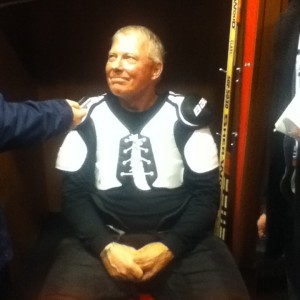
Clarke hired the late Roger Neilson, one of the game’s most innovative thinkers, as Florida’s first head coach before the 1993-94 season. Neilson led the New York Rangers to a Presidents’ Trophy two seasons earlier.
At the 1993 expansion draft, Clarke built a solid foundation for the Panthers to get off the ground. The team had half of the 48 total picks at that draft.
The Panthers’ selections included goalie John Vanbiesbrouck, workhorse defenceman Paul Laus, wingers Tom Fitzgerald and Scott Mellanby, Dave Lowry, Brian Skrudland and Bill Lindsay.
Several of those players would become key pieces of the Panthers’ run to the 1996 Stanley Cup Final.
As a coach, Neilson guided the Panthers to a 33-34-17 record in his first full season behind the bench, good for 83 points and the best record for an expansion club in NHL history. Remember, games often ended in ties back then, too.
Clarke left the team at the end of the Panthers’ inaugural campaign to work for the Flyers, where he had been successful as a player in the two previous decades.
The following year was shortened by a lockout. In 1994-95, Neilson and the Panthers went 20-22-6 in 48 games, good for 46 points. But Neilson parted ways with Florida following that season and joined the Flyers two years later, much like Clarke did in 1995.
The Panthers missed the playoffs in both of their first two seasons.
The Murray-MacLean Years: 1995-2000
The next era in Panthers history had plenty of turnover on the coaching side, as the team saw three bench bosses come and go in a five-year span.
The first one was Doug MacLean, who was brought on for the Panthers’ third campaign in 1995-96. He led the team to a 41-31-10 record in 82 games, good for 92 points (the fourth-best total in franchise history).
The Panthers also enjoyed their deepest playoff run to date under MacLean’s guidance, as they beat the Boston Bruins in the first round, overcame the Flyers in the second and edged the powerhouse Pittsburgh Penguins in the Eastern Conference Final before being swept by a juggernaut Colorado Avalanche squad in the Stanley Cup Finals.
The following season, the Panthers flew out of the gate and went undefeated for 12 games, but faltered down the stretch and fell to the legendary Wayne Gretzky and the Rangers in five games in the post-season.
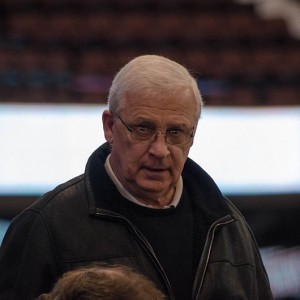
In 1997-98, the Panthers’ 7-12-4 start led to MacLean being fired and replaced with GM Bryan Murray, who had taken over after Clarke’s departure in 1994.
Under coach Murray, the team went 17-31-11 in 59 games. The Panthers’ 24-43-15 finish that year was its second-worst in history.
Murray stayed on as GM until Dec. 28, 2000, but he was replaced by his little brother, Terry Murray, as head coach. The younger Murray missed the playoffs again in 1998-99 with a 30-34-18 record, but the Panthers returned to the post-season a year later and were swept by the New Jersey Devils in the first round.
More Turnover in the Early 2000s
The Panthers’ revolving door of coaching and management continued as the team approached its first decade in the NHL.
Terry Murray’s start as a coach in 2000-01 left lots to be desired, as the team went 6-18-12 in its first 36 games before Murray was relieved of his coaching duties in Florida. His older brother left the team almost a year earlier, being replaced by former Panthers president Bill Torrey.
Torrey only lasted about a year in the GM role, but coach Duane Sutter stuck around for the rest of the 2000-01 season and never coached in the NHL again after going 22-35-8 in 72 games over parts of two seasons with the Panthers.
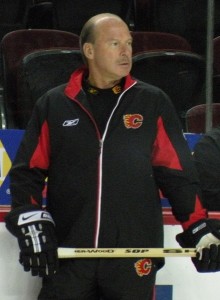
Sutter was replaced behind the bench by the controversial Mike Keenan, who failed to post a winning record over close to three seasons at the helm between 2001-02 and 2003-04.
Keenan also served as GM from 2004 to 2006, but he abruptly resigned in September 2006 shortly after infamously trading franchise goalie Roberto Luongo, defenceman Lukas Krajicek and a sixth-round draft pick (that became Sergei Shirokov) to the Vancouver Canucks for struggling forward Todd Bertuzzi, netminder Alex Auld and rearguard Bryan Allen.
For the rest of the 2003-04 season, Rick Dudley and John Torchetti split the coaching duties for the Panthers. They combined for a 23-27-17 record before current Penguins assistant Jacques Martin took over after the 2004-05 lockout.
Post-Lockout: Less Turnover, but Continued Futility
In three years with the Panthers, Martin didn’t get the Panthers back to the post-season, although he went 110-100-36 and avoided losing seasons for his entire stint in Florida.
Martin also was in the GM’s chair from 2006 to 2009. He was succeeded by Randy Sexton until 2010.
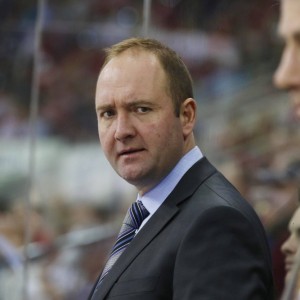
Peter DeBoer served as bench boss for the next three years. Like Martin, DeBoer couldn’t bring the team back to glory either, despite a 93-point season (41-30-11) in his first year in Florida.
The Panthers’ struggles continued in DeBoer’s last two years, and he was fired after a disappointing 2010-11 campaign.
The team did return to the post-season, albeit briefly, under head coach Kevin Dineen in 2011-12.
However, the Panthers fell in the first round to New Jersey, and Dineen was canned a year and a half later and replaced by interim coach Peter Horacek.
Things got worse under Horacek, who went 26-36-4 in 66 games and was gone at the end of that year.
The Present: Tallon, Rowe and Gallant
The Panthers embarked on another rebuild when Dale Tallon was named GM in May 2010. He hired Gallant as head coach four years later, a move which paid off as Florida went 38-29-15 in his first year, but still fell short of a playoff berth.
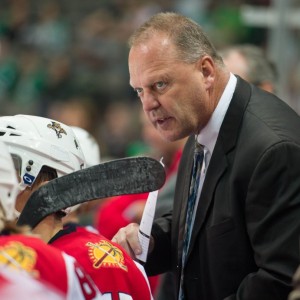
The Panthers followed that performance with their best regular season yet, going 47-26-9 for 103 points and finishing first in the Atlantic Division. Florida lost to the New York Islanders in six games in the first round of the post-season, though.
Tallon moved to an executive role and was replaced by Rowe as GM, but when the Panthers stumbled to an 11-10-1 start amid injuries to several key players like Jonathan Huberdeau and Nick Bjugstad throughout the season, Gallant was given the boot.
Rowe then took over the bench, and the team was treading water until Huberdeau and Bjugstad became healthy.
Florida is 16-10-9 under Rowe and is currently third in the Atlantic Division. The Panthers are also on a four-game winning streak.
With 26 games left, anything can happen, but the Panthers will need to play consistent hockey from here on out if they hope to make the post-season for a second straight year.